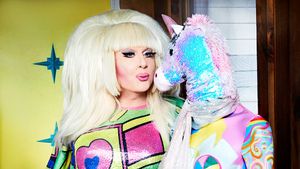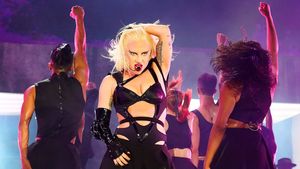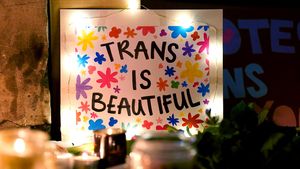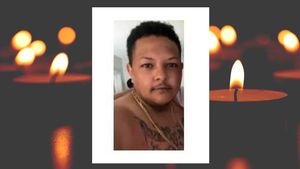
CONTACTCAREER OPPORTUNITIESADVERTISE WITH USPRIVACY POLICYPRIVACY PREFERENCESTERMS OF USELEGAL NOTICE
© 2025 Pride Publishing Inc.
All Rights reserved
All Rights reserved
Don’t miss our hottest news! Sign up today for our free newsletter.
Trending Tags
Trending Tags
By continuing to use our site, you agree to our Private Policy and Terms of Use.
Accept
As a millennial, the internet has played an essential part in how I gather information, how I build communication skills, and how I go about forming an opinion on politics. What’s most revolutionary about the internet (and social media in particular) is what it has done for people and their many identities. The mainstream media and the normative, more privileged, culture of the West have been forcibly challenged by people unapologetically being themselves, and online culture is partly to thank for that. Discussions about race, gender, socio-economics, climate change, and LGBT rights have accelerated tremendously in the past few years and I really believe online activism has done something remarkable for identity politics in this day-and-age. But is there ever a point where it can all just get to be too much?
The New York Times called 2015 “the year we obsessed over identity.” It’s become commonplace in progressive online communities to discuss what people ‘identify as,’ whether they be latino, white, black, a man or woman, gay, or straight, cis or trans. Modern politics are shaped entirely around their identity, and much of this discussion happens online. The internet allows us to build a character of ourselves and we can project whatever identity we want to the world wide web. Because identity is inherently connected to one’s ego, this type of behavior can lean towards narcissism, and the serious side effect of one’s online identity politics has potentially made it so that over-identifying creates a fragility in conversations and places a tension in building relationships.
I know that I have over-identified with many things at different times. Over-identifying has served purposes for me. When I got sober, it was really important to identify as an addict so I didn’t relapse. When I came out a trans, I over-identified to make it clear to those around me who had questioned my transition, that I was in fact transgender. I over-identified as a feminist because I harvested a lot of guilt for transitioning to male. By holding these identifiers so near to me, it made it hard for me to be open to other ideas and other views, because they were not just threatening my identity politics, but (it felt like) they were now threatening me personally because my identity politics had become such a large part of my everyday life.
Everyday when I get online I see the present state of self-identity, in which we’ve created personalities and politics dependent on outside affirmation while simultaneously feeling guilty for our own privilege and trying to police others like us in the name of ally-ship. This takes different forms. I scroll down my timeline and see white privilege being checked. Male privilege is called out. Gay culture is reprimanded for its transphobia. White women are criticized for their attitudes towards black women. Monogamy is challenged by the poly community. One Democrat calls another a war monger for supporting Hillary Clinton over Bernie Sanders. A lot of these things are good actions to take, but many of them also feel unintentionally self-centered. People bind their whole reality in their personal identity and the more they experience imperfect affirmations and general criticism of that identity, their online (and sometimes in-person) interactions begin to feel like a serious threat, rather than someone else merely having a different opinion or a lack of education.
One night, as I was battling with thoughts of depression, anxiety, and bottom dysphoria, I decided to post something on my personal Facebook account to encourage myself and other trans folks. I wrote, “Being transgender is actually really fucking cool.” The comment felt innocent, non-political, and uplifting enough, and because it was on my Facebook, it was very personal to me. While I received a lot of support of the post, I also faced an equal amount of outrage, watching allies, trans people, and other queer people fight with one another and attack me in the comment section. Some told me I was a trans misogynist. Others said I was privileged. Some other trans people who don’t like being trans told me that I was somehow speaking for everyone by claiming that being transgender was cool. I walked away with the notion that I was not allowed to say (at least online) that being transgender is positive and I should feel guilty for liking that part about myself.
Identity, to me, feels like it’s become a prejudiced and short-sighted occurrence. Conversations towards change have become a pitting of identities against one another, and even ourselves. It feels like our guilt and ego has taken over and we are unintentionally hurting each other. As a collective, we shift from liberation to fragmentation and back to oppression when we let something like identity politics and difference of opinion have of power over us. When do the call-outs lead to change?
Not only is being unkind to one another, cutting each other down, and nitpicking unnecessary and harmful to all involved, it’s also harmfully distracting. It takes away from the work we could be doing internally on ourselves and within our communities. Identity politics are supposed to be helpful towards societal fairness, but lately it feels like we’re creating a society that doesn’t leave room for transformation, healing, or kindness. I believe that we can balance the lived realities among us while also supporting those different from us, without clinging to the idea that essentially states we all need to be, think, and feel the same in order to be respected or generate change. Opening our hearts feels like the next phase in radical change.
From our Sponsors
Most Popular
Celebrities with OnlyFans accounts to thirst over
January 02 2025 11:55 AM
All-time greatest lesbian sex scenes in movies & where to stream them
December 13 2024 12:47 PM
34 same-sex couples who don't mind the age gap
December 17 2024 6:29 PM
25 reasons being a bottom is tougher than being a top
September 10 2024 2:44 PM
Here are the reasons 'straight' men hook up with guys
December 17 2024 1:05 PM
30 awkward things guys do in saunas
September 10 2024 12:01 PM
101 gay sex tips you didn't learn in sex ed class
December 18 2024 6:03 PM
Popular gay slang inspired by the animal kingdom explained
December 12 2024 1:25 PM
Golden Age of Hollywood stars you probably didn't know were LGBTQ+
December 04 2024 12:31 PM
35 of the funniest drag queen names
September 12 2024 4:17 PM
Don’t miss our hottest news! Sign up today for our free newsletter.
Latest Stories
Margaret Cho doubles down on Luigi Mangione support: 'He puts the rizz in terrorist'
February 21 2025 12:05 PM
A progressive podcast just dethroned Joe Rogan, what to know about the 'MeidasTouch Podcast'
February 20 2025 3:00 PM
Here's how 'The Traitors' star Gabby Windey became the lesbian icon we want and deserve
February 20 2025 12:13 PM
Why Donald Trump’s suits are a sign that he’s separating himself from his MAGA base
February 20 2025 6:00 AM
People shocked by the NSFW reason this 'gayest tattoo ever' is going viral
February 20 2025 7:00 PM
Actor Dan Stevens recalls being surrounded by 'horny gay men' when he checked out Grindr
February 20 2025 5:16 PM
Melanie Lynskey to reunite with Natasha Lyonne in 'Poker Face' season 2
February 20 2025 2:17 PM
Adult star Filou Fitt reveals his favorite type of steamy scene to film
February 20 2025 5:38 PM
Are you on the aromantic spectrum? What that means and why it matters explained
February 20 2025 4:09 PM
Brittney Griner cancels speech after finding threatening 'Gay Baby Jail' note in hotel room
February 20 2025 1:06 PM
'Faith Healer': How Julien Baker helped me survive my body
February 20 2025 7:00 AM
Trending Stories
Recommended Stories for You

Basil Soper
Basil Soper is a transgender writer, activist, and Southerner who wears his heart on his sleeve. He's an astrology enthusiast and tears up when he watches unexpected-animal-friend videos on the internet. Basil's life goals are to write a memoir and be the best uncle ever to his niece, Penelope. Learn more about Basil at ncqueer.com.
Basil Soper is a transgender writer, activist, and Southerner who wears his heart on his sleeve. He's an astrology enthusiast and tears up when he watches unexpected-animal-friend videos on the internet. Basil's life goals are to write a memoir and be the best uncle ever to his niece, Penelope. Learn more about Basil at ncqueer.com.





























































































































